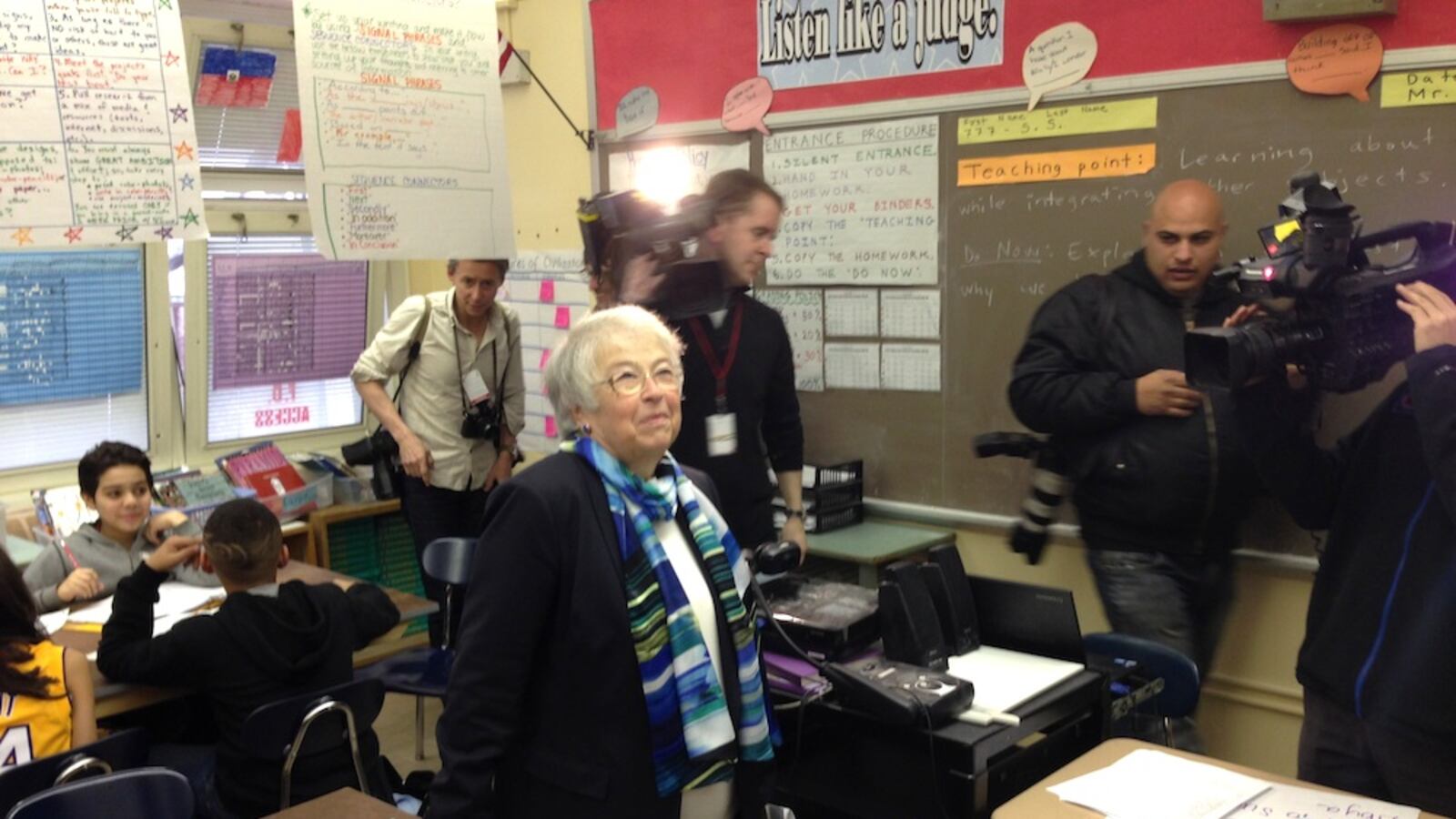Nearly 100 days into her tenure, Chancellor Carmen Fariña’s dreams are finally coming true.
That’s how she framed the launch today of a new program to pair schools in hopes that their collaboration will lift school quality. It is the first major policy announcement for Fariña, whose tenure up to now has consisted largely of boosting morale, putting out fires, and promoting the de Blasio administration’s pre-kindergarten expansion.
“It’s not often in a lifetime that you get your dreams to come true,” Fariña said at a splashy press conference inside a classroom at J.H.S. 88 in Park Slope, one of the seven schools picked to help two “partner” schools work on specific weaknesses. “And today is one of those times that my dreams are coming true.”
The Learning Partners Program is the citywide version of a program that Fariña instituted when she was a local superintendent more than a decade ago. For months, even before she was appointed to run the school system, she advocated using “demonstration schools” to highlight practices that other schools could emulate.
That kind of sharing will anchor the city’s efforts to improve schools, Fariña said today. “It really boils down to … you learn best when you learn together,” she said.
Officials said the new initiative — which Fariña said was so important that she launched it faster than some confidantes advised — is meant to foster “collaboration, not competition” among schools. They were offering a veiled criticism of the Bloomberg administration’s approach to school improvement, which centered on giving schools letter grades that weighed their relative performance and shuttering the weakest performers.
“Don’t be looking for A’s and B’s and all of that craziness,” said Council of School Supervisors and Administrators President Ernest Logan, referring to the city’s annual report card grades. “Forget that. Let’s talk about what works in these buildings.”
Those conversations will happen during frequent visits between host and partner schools. Over the 12 weeks before the end of the school year, the host schools will send teams on 10 school visits and host six visits of their own — in addition to carrying out their regular activities.
A Department of Education official will coordinate the meetings for each host-partner relationship. Beyond that, officials did not say today whether the host schools would get extra resources in exchange for the new duties, or whether partner schools would get help implementing the lessons they learn.
But Christina Fuentes, a former principal who heads the initiative, said the participating schools were fully on board with the project — and the city is counting on enthusiastic principals to enable a rapid expansion. The department is soliciting applications now for schools to join the program this fall, when it will expand to as many as 72 schools.
“We have put this together in basically a month,” Fuentes said. “And the degree of commitment and excitement is just palpable.”
Eligible host schools must have received a good evaluation from city reviewers, and schools won’t qualify if they screen for all of their students. Qualifying principals will also need to have at least five years of “leadership experience within one school,” according to the city.
Fariña praised the pilot host schools as having found special ways to reach their student populations. M.S. 88, for instance, does a particularly good job of using technology, while M.S. 223 in the Bronx is especially strong at bringing the arts to a high-need community. Eagle Academy for Young Men II — whose principal, Kenyatta Reid, saw his previous school closed due to low performance after he left — will show off how it meets students’ social and emotional needs.
Fariña said charter schools would be included in the program if they apply.
“Remember the original charter movement was also to add value to what we were doing,” Fariña said. “They were supposed to be doing something cutting edge, so to the degree that some of them are, and want to be a part of it, then absolutely.”
Fariña pointed out that many of the schools that are leading the effort were once struggling schools that have since turned around and are now on an upward trajectory. She said that she hopes the improvements will spread as some partner schools eventually become host schools.
“We don’t have to keep reinventing the wheel,” Fariña said. “We can replicate what works and just refine it.”
She added, “We’re hoping that by June, we’ll bring them all together and say, how do you think your school got better?”
Wake up to a comprehensive round-up of New York City education news by signing up for our Rise & Shine newsletter here.

